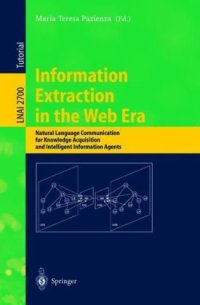
Ebook: Information Extraction in the Web Era: Natural Language Communication for Knowledge Acquisition and Intelligent Information Agents
- Genre: Computers // Networking: Internet
- Tags: Information Storage and Retrieval, Database Management, Information Systems Applications (incl.Internet), Artificial Intelligence (incl. Robotics), Business Information Systems
- Series: Lecture Notes in Computer Science 2700 : Lecture Notes in Artificial Intelligence
- Year: 2003
- Publisher: Springer-Verlag Berlin Heidelberg
- City: Berlin; New York
- Edition: 1
- Language: English
- pdf
The number of research topics covered in recent approaches to Information - traction (IE) is continually growing as new facts are being considered. In fact, while the user’s interest in extracting information from texts deals mainly with the success of the entire process of locating, in document collections, facts of interest, the process itself is dependent on several constraints (e.g. the domain, the collection dimension and location, and the document type) and currently it tackles composite scenarios, including free texts, semi- and structured texts such as Web pages, e-mails, etc. The handling of all these factors is tightly related to the continued evolution of the underlying technologies. In the last few years, in real-world applications we have seen the need for scalable,adaptableIEsystems(seeM.T.Pazienza,“InformationExtraction:- wards Scalable Adaptable Systems”, LNAI 1714) to limit the need for human interventioninthecustomizationprocessandportabilityoftheIEapplicationto new domains. Scalability and adaptability requirements are still valid impacting featuresandgetmorerelevanceintoaWebscenario,whereinintelligentinfor- tionagentsareexpectedtoautomaticallygatherinformationfromheterogeneous sources.
This book presents revised versions of lectures given at the Summer Convention on Information Extraction, SCIE 2002, held in Frascati, Italy in July 2002. The following lectures by leading authorities in the field of information extraction are included:- acquisition of domain knowledge- terminology mining- finite-state approaches to Web IE- measuring term representatives- agent-based ontological mediation in IE systems - information retrieval and IE in question answering systems- natural language communication with virtual actors.